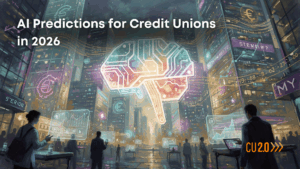As credit unions evaluated AI in recent years, the buzz around job automation shifted from hopeful to urgent. When the original post ran in 2022, AI was still emerging. Now, in 2025, advanced AI tools are part of everyday workflows—even in slower‑adopting sectors like ours.
It’s time to revisit which roles are changing…and what you can do to adapt.
Who Will AI Affect… Really?
Most US adults believe that AI will “eliminate more jobs than it creates,” but very few are worried about losing their own jobs. Clearly, people understand the theoretical capabilities of AI… but is there a disconnect when it comes to how it will affect them?
Yes. But will it change your job, or take it?
Whether you’re a bank teller, a member service or call center representative, a credit union CEO, finance or accounting person, or an IT professional, the reality is that automation and AI are 100% going to impact your job.
How AI Will Affect Your Job
Now, just because your job will be “impacted” doesn’t necessarily mean that it will be eliminated. Most people tend to think that job replacement means a robot shows up one day does your job for you. Yet, most automation is actually a progression of changes.
Think back to 1992 when tellers had calculators, debit and credit batch headers, and cash drawers. Everything was manual. Within 10–15 years, the debit and credit batch headers were gone, and everything was done through PC applications.
A few years later, we added cash dispensers and saw the cash draw diminish. Now almost nobody has a calculator, Check 21 scans our checks, and ITMs replace entire branch teams. The progression took 20–30 years and shifted over time.
AI adds automation tools that replace specific manual tasks. Instead of management tools and platforms that help employees to behave like robots, we leave the repetitive stuff to automation and AI.
In general, we’re not good at predicting where job losses come from—and they don’t really come from this automation progression. Instead, they stem from innovation around work processes. For example, spreadsheets ousted armies of data entry staff. We didn’t replace the work, but we changed the nature of it.
The Jobs AI Will Affect First
Although all jobs will eventually be changed by AI, some will experience progressive changes before others. Here are 3 of our predictions, plus a killer application idea that could completely eliminate a traditional job.
1. Call center representatives
Call Center Representatives remain most impacted, though now 90% of routine queries are handled by AI chatbots or voice bots. Live agents step in only for complex or sensitive conversations.
When live reps are needed, AI-powered voice biometrics and similar technologies will reduce the average handling time by eliminating the need for ID verification.
Additionally, each call center rep will have a context app that shows them how to deliver the information more efficiently to the member according to the member’s sentiment to help create an engaging experience. Up to 75% of routine transactions will be switched to self-service chat bots etc. Finally, language-specific skills won’t be a barrier because AI will automatically translate for the employee and member.
The killer change: An app that automates consumer lifestyle banking. Imagine each consumer sets financial goals, and AI moves money, deposits checks, pays bills, etc. according to their identity and bank account.
Something like Cache might fit the bill here (click to learn more!).
2. Accounting positions
Accounting Positions are increasingly automated with AI‑enabled reconciliation and anomaly detection. CFOs and accountants now spend less time running reports and more time interpreting AI‑generated insights.
Accounts Payable and reconciliations will be automated. Fraud detection uses AI and machine learning (ML) to detect anomalies quickly and accurately. AI improves financial analysis improves by using increasing amounts of data to make better predictions and trends. Check holds, fee analysis, and monthly reporting will all be automated.
The killer change: DeFi- or blockchain-based identities with a real-time general ledger that enables 100% transparency and tracking of data into whatever form both parties want. Essentially, most of accounting creates individual versions of truth, whereas distributed ledger technology allows us to share a truth.
3. Lending positions
Lending fintechs like Scienaptic have proven that AI models make faster, better underwriting decisions than humans. Expect universal adoption on these for 80% of loan decisions. Fully digital lending systems will replace the multitude of patchwork solutions for applications, underwriting, funding, electronic signatures, and paperwork.
Lending Roles continue to evolve. AI underwrites up to 85% of standard loans—humans now focus on exceptions, relationship lending, and higher‑risk cases.
The killer change: A syndicated network of lenders that enables credit unions to deploy capital efficiently without actually making individual loan decisions, all in real time.
Want to learn about real-time loan participations? Start here:
Of course, we have no idea which (if any) of these will happen. Predicting the impact of technology, especially when AI is concerned, is difficult at best. But we can assure you each position mentioned above will change somehow.
How to Prepare for an AI Future
If the reality is that AI will affect all our jobs—and eliminate some of them—then it’s natural to ask:
What should we do?
To avoid becoming obsolete, we can focus on developing skills where AI can’t (yet) do better. Here are three ways to remain professionally relevant in the age of AI:
- Focus on surprise: It turns out that automation and AI are not so good when unexpected things happen. So, focus on grey areas and learn to problem solve in poorly defined or unstructured situations. Humans are actually pretty good when it comes to the unexpected.
- Develop your social skills: Focus on your emotional intelligence. Skills like empathy, listening, and building relationships make you invaluable and hard to replace. A beloved member service rep who makes a few mistakes is better than one who is 100% accurate but creeps out members. These skills help people build culture, lead teams, and help others succeed.
- Understand the scare areas: AI is great with large amounts of data. But there are tons of things that happen only rarely in a credit union, which makes them hard to automate or solve with AI. Add value by finding those things, developing expertise around them, and handling uncommon and unique problems.
- Get comfortable with AI. Take time to learn how your AI tools work. Tinker with prompts, test their limits, and ask “why” when their answers surprise you. The goal isn’t to replace humans—it’s to elevate what humans do best: connect, strategize, and decide.
Additional Resources
The key to developing a healthy, long-term culture that includes AI and values humans is good (and frequent) strategic planning. See our Strategic Planning Facilitators Guide for suggestions on where to look.
Also, sign up for our Fintech Call Program and get a personalized, 30-minute call each quarter. We’ll discuss the latest technologies and solutions, make key introductions, and offer early access to events, giveaways, and more!
If you want high-level AI coaching for you and your executive team, reach out to us here:




